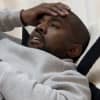Tired of reading the same recommended books from the usual sources? Just think of our weekly What We’re Reading column as your non-committal book club with FADER and some of your favorite bands. For this installment, FADER contributor Matthew Trammell gives a close read of the parenting guide Kanye's mother, the late Dr. Donda West wrote in 2007.
Raising Kanye: Life Lessons from The Mother of a Hip-Hop Superstar
by Donda West
I’ve been listening to Yeezus consistently since the day it leaked, and I’m still somewhat torn about it. On one hand, the production is unparalleled, “New Slaves” is one of the greatest rap songs in recent memory, and Chief Keef’s singing makes me want to shed a thug tear and catch a body at the same damn time. But on the other, where does this album really stack up in Kanye's discography? I’ve found myself asking why. Why did he make this album at this moment? What is this in reaction to? Is this really about paparazzi? About racist fashion designers? About young niggas in Chicago? About contextualizing his homie’s clothing line? (Full disclosure: I own a Been Trill shirt.) Like any engaging art, the album seized my attention and made me want to understand Ye’s current incarnation more deeply. So I ordered Dr. Donda West’s Raising Kanye, the autobiography Kanye’s mother wrote to explain her son, and have found it to be an essential companion piece to the album. if Ye really is 'Yeezus', this is the New Westament.
Donda presents the book as a guide to motherhood, sharing her parenting methods and philosophies with the unfurling authority one would expect from a former college professor. “I always believed that children aren’t these silent slaves who should be seen and not heard,” she explains, and thus as a child Kanye was rarely yelled at, and encouraged to express his opinion. She writes about him with a deep affection and constantly defends him. She recalls Little Kanye intentionally coloring bananas with purple crayon (“Who said bananas had to be yellow?”) and walking up to a bunch of ducks in a pond and telling them they were quacking incorrectly (“Maybe the ducks were quacking wrong”). Her main goal in writing the book, it seems, was to justify Ye’s perceived arrogance as a deliberately-instilled sense of pride and self assurance that she saw as vital for her young black son growing up in America to possess. It’s one she had as well, and after a few chapters the reader gets the sense that Kanye’s strong will and sense of self may not have just been taught, but inherited. After his incident with Taylor Swift at the 2009 VMAS, Kanye was overheard at a nearby diner venting about his mother. He knew if she were there, she would’ve supported his viewpoint, if not his execution.
The book’s most revealing scenes find Donda recounting her own childhood experiences as a young girl in the American South in the '50s. She dives deep into the family lineage, tracing their path from Oklahoma City to Chicago, a Southern family finding new context in the (somewhat) liberal Midwest. Often, she finds illuminating parallels between the Civil Rights era she’d come of age in and the hip-hop culture that her son came to embody. She muses on young Black people’s use of the word “nigga,” revealing that she’d heard family friends casually using the phrase “you my nigga” as early as the mid '50s. She casually makes reference to the blacklisting of Eartha Kitt after speaking out against Vietnam when discussing Ye’s Hurricane Katrina "George Bush doesn't care about black people" moment, and likens persecuted homosexuals to “strange fruit hanging from a tree,” six years before Kanye would sample the chilling Billie Holiday standard on his latest album (also tying it to sexual imagery, no less). These were the anecdotes and asides that Kanye grew up hearing from his mom both in casual conversation and during pep talks. It’s no coincidence the first Yeezus lyric the world heard was My momma was raised in the era when / clean water was only served to the fairer skin.
Despite never seeming farther away from the bear mascots and pink polos of his early days, Kanye’s latest effort is his most regressive. He hasn’t engaged with that ugly American era this directly since he reminisced about his mom being arrested for sit-ins on his debut. It appears that, on the verge of fatherhood himself, Ye has come full circle, searching for guidance on this next step in his life from the jewels that his mother dropped during hers. Raising Kanye was published in 2007, the same year Donda tragically passed due to complications from a cosmetic surgery. It’s a bittersweet read—we know how the story ends, and some passages are particularly sobering, including her imagining the kind of father Kanye would turn out to be when he had kids. But it’s still a rich window into Kanye’s psyche, particularly at this perplexing moment in his career. It makes sense that his DONDA project, while largely mysterious, appears to exist solely to impose his will on the world by any means necessary—this is how things should look, this is how things should sound, this is how things should be. It’s the worldview his mother held till her passing, and one worthy of carrying her name.


